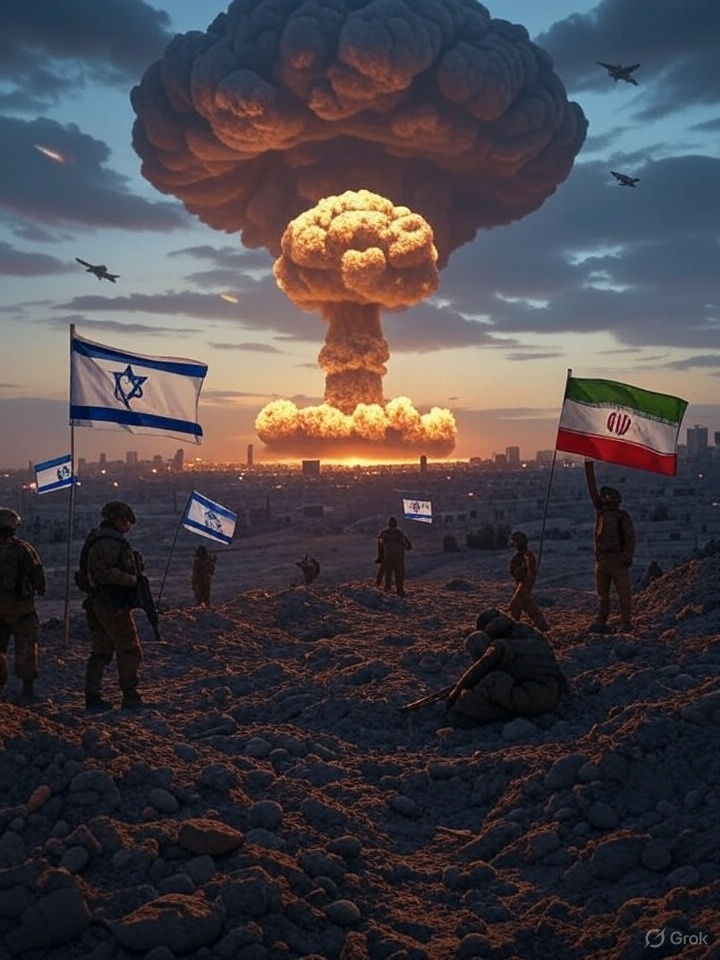As tensions in the Middle East escalate to dangerous new levels, Israeli media reports that the United States may formally join Israel’s ongoing military conflict with Iran as early as tonight. If true, this would mark a dramatic and historic escalation with potentially global consequences.
The Road to This Moment The seeds of this confrontation have been growing for months. Israel has long viewed Iran’s nuclear program as an existential threat. Despite years of covert operations, diplomatic pressure, and sanctions, Israeli leadership — under Prime Minister Benjamin Netanyahu — has grown increasingly convinced that military action is the only way to stop Iran from developing a nuclear weapon.
Initially, President Trump had been reluctant to endorse a military strike, preferring to continue negotiating with Iran. His 2020 campaign promises emphasized avoiding new wars in the Middle East. However, as negotiations with Tehran stalled, and as Netanyahu privately warned that Israel was prepared to act unilaterally, Trump’s stance began to shift.

Multiple intelligence reports, reviewed by U.S. and Israeli officials in recent weeks, suggested that Iran was inching closer to the technical capabilities required to assemble a nuclear bomb. Though U.S. intelligence assessments remained divided on how imminent the threat was, Netanyahu argued that waiting any longer would be too dangerous.
In private conversations with his advisers, Trump expressed frustration with the diplomatic deadlock and increasing suspicion that Iran was exploiting negotiations to buy time. Meanwhile, Israel’s preparations for military action became more visible. Intelligence gathering intensified; Israeli special operations reportedly began positioning forces inside Iran’s borders in advance of a possible strike.
High-Level Consultations. In recent days, President Trump has been in constant contact with his top advisers — including Vice President J.D. Vance, Secretary of State and National Security Adviser Marco Rubio, and Director of National Intelligence Tulsi Gabbard. According to sources, the White House has been weighing several military options, ranging from limited support operations to full-scale joint military action with Israel.
A recent call between Trump and Netanyahu reportedly tipped the scales. Netanyahu briefed Trump on Israel’s detailed military planning, including operations already underway inside Iran. Impressed by the scope and sophistication of the Israeli strategy, Trump reportedly told his aides, “I think we might have to help him.
”While no formal commitment was made publicly, Israeli media is now reporting that U.S. military assets are on high alert and may join the conflict tonight. This could include American air support, intelligence sharing, mid-air refueling operations for Israeli jets, and possible direct strikes against Iran’s hardened nuclear facilities.
A Divided Washington. The prospect of U.S. involvement has sparked sharp divisions within Trump’s own party. While many Republicans — particularly those aligned with traditional pro-Israel positions — support a strong show of force, others on the party’s anti-interventionist wing are warning of the dangers of being drawn into another prolonged Middle Eastern conflict.
Privately, Trump has acknowledged these tensions but has argued that unlike previous interventions, the stakes here are fundamentally different. He sees a nuclear-armed Iran not just as a regional threat, but as a direct danger to American allies and U.S. security interests.
What Could Happen TonightIf the reports are accurate and the U.S. military joins Israel’s assault tonight, the consequences could be swift and severe. Possible scenarios include.
Massive strikes on Iran’s nuclear facilities, including deeply buried sites like Fordo.
Retaliatory missile attacks by Iran against U.S. forces in the region and Israeli cities.
Escalation involving Iranian proxies such as Hezbollah in Lebanon and militias in Iraq and Syria.
Disruption of global oil markets, sending prices soaring and triggering economic repercussions worldwide.
Potential expansion of conflict, drawing in other regional powers and possibly even global rivals like Russia and China.
A Calculated Gamble .For both Netanyahu and Trump, the decision to escalate carries enormous risks. But both leaders believe that the risk of inaction is greater. Netanyahu has argued for years that Israel cannot afford to live under the threat of a nuclear Iran. Trump, meanwhile, may see decisive action as a way to strengthen his image as a leader who confronts threats directly rather than relying on drawn-out diplomacy.
However, the path ahead is highly uncertain. Even a swift and successful military operation could spark long-term instability across the Middle East, further entangling the U.S. in a region from which many Americans have sought to disengage.
The World Watches

As night falls, the world is holding its breath. If U.S. forces enter the fight alongside Israel tonight, we may be witnessing the beginning of one of the most significant military conflicts of the 21st century. The coming hours will likely determine not just the future of Iran’s nuclear ambitions, but the broader balance of power in the Middle East — and perhaps the world.
